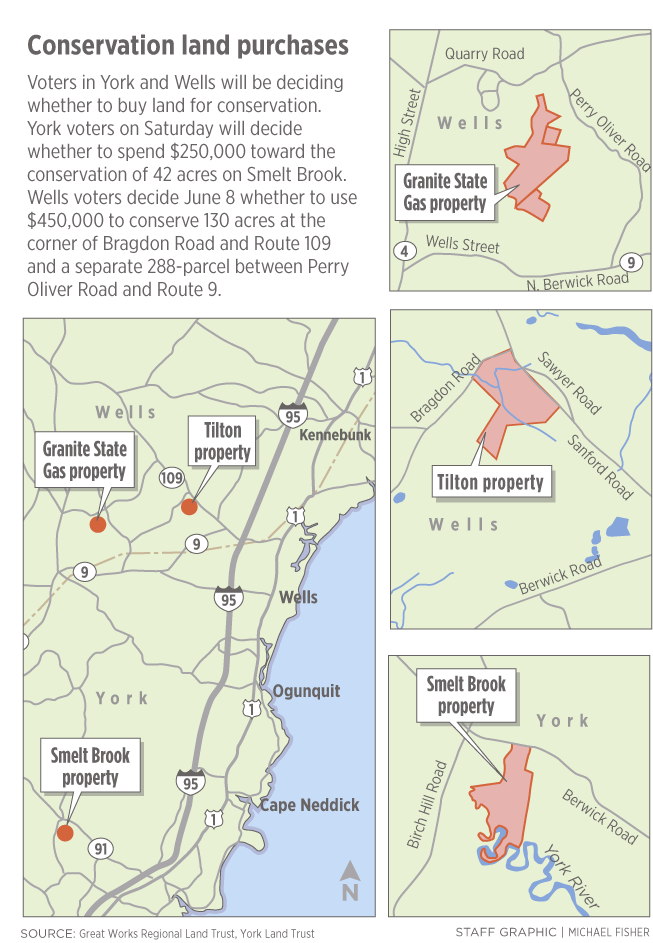Voters in York and Wells will decide soon whether to put money toward the conservation of land deemed valuable wildlife habitat.
On Saturday, York voters will determine whether the town should borrow $250,000 to protect 42 acres on Smelt Brook from development. The York Land Trust would own and manage 31 acres and the landowner, Julia Clough, would retain ownership of the remaining 11 acres while donating a conservation easement valued at $200,000.
“There is a lot of riverfront in this project. That’s really the basis for the conservation argument,” said Nancy Grace Lowenberg, the York Land Trust’s director of development.
The addition of the Smelt Brook property would create 325 contiguous conservation acres along the north section of the York River. The brook, a major tributary of the York River, includes spawning habitat for rainbow smelt, which is in decline in the Gulf of Maine.
The Smelt Brook property had been subdivided into 10 building lots. One has been developed, another is on the market and a third is Clough’s homestead. The land trust bought two lots previously and would now buy five more.
The land trust will provide a 2-to-1 match of town funds through its own fundraising. The town’s contribution would trigger a $50,000 challenge grant from the Maine Community Foundation’s Stand Up and Be Counted Fund, which was set up through an anonymous donor. The total debt payment for York would be $355,000, assuming 4 percent interest over 20 years.
On June 8, Wells voters will decide whether to use $450,000 from the town’s land bank to buy the Tilton property, 130 acres in the Merriland River corridor at the intersection of Bragdon Road and Route 109; and the Granite State Gas land, 288 acres between Perry Oliver Road and Route 9.
The Tilton property abuts other town conservation land in the Great Haith. The tract was deemed the most important due to its frontage on the Merriland River and Haith Brook, its large size and its public use, said Keith Fletcher, a member of the town’s conservation commission and a board member of the Great Works Regional Land Trust.
Fletcher said the tract, which would become part of town conservation lands, has much development potential. There is significant road frontage and 42 housing units are being put in across the street, he said.
The Granite State Gas land, now owned by Unitil, can protect water quality in headwaters, forested wetlands, West Stream and Perkins Brook, which drain into the Great Works River, according to Tin Smith, stewardship coordinator for the Wells reserve and a Great Works Regional Land Trust board member.
The U.S. Fish and Wildlife Service has identified the area for establishing the New England cottontail rabbit, which was once plentiful but has suffered a sharp population decline with the loss of its shrub habitat.
Because the money would come out of the land bank, the purchase would not increase property taxes, Fletcher said. About $200,000 would remain in the land bank if the purchases are made.
The Tilton purchase would cost a total of $500,000 and Granite State Gas land $400,000. Fundraising and grants would cover the portion not covered by the town.
Selectman Jim Spiller opposed putting the proposal on the ballot because he felt there wasn’t enough time to review it. He wonders whether the Tilton property should be targeted, given that much of it can’t be developed anyway due to wetlands. He also has concerns that the Granite State Gas land is a standalone parcel that does not connect to other conservation land.
“I have some reservations about both properties. I would like more discussion in public,” he said.
Staff Writer Ann S. Kim can be contacted at 791-6383 or at:
akim@pressherald.com
Send questions/comments to the editors.



Success. Please wait for the page to reload. If the page does not reload within 5 seconds, please refresh the page.
Enter your email and password to access comments.
Hi, to comment on stories you must . This profile is in addition to your subscription and website login.
Already have a commenting profile? .
Invalid username/password.
Please check your email to confirm and complete your registration.
Only subscribers are eligible to post comments. Please subscribe or login first for digital access. Here’s why.
Use the form below to reset your password. When you've submitted your account email, we will send an email with a reset code.